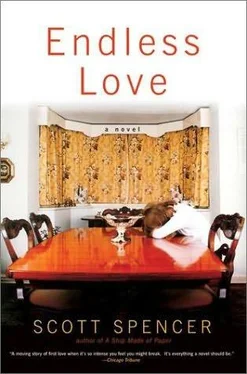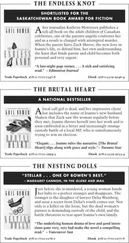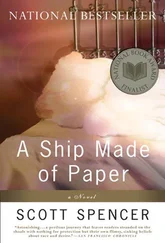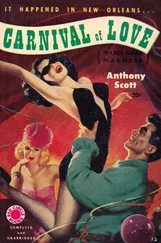Judge Rogers gave us a week to conclude my adolescence in Chicago and get me ready for Rockville Hospital, which was about one hundred miles downstate in the town of Wyon, Illinois. I was still, of course, forbidden to contact any of the Butterfields—or even to make enquiries after them. It was made clear to me that the Butterfields, Hugh in particular, had been the outraged party in my case. Hugh had petitioned the court a number of times; the only evidence that had tempted Rogers to be less lenient with me had come from Hugh. This wounded me without surprising me and I felt that terrible sickness you get when you must acknowledge the righteousness of your attacker. I understood and, in my woozy, isolated, heart-mad way, even endorsed Hugh’s complaints against me, his right to want me punished with crushing severity—but I also had to believe that Hugh was alone in this, that Ann, and certainly Jade, did not align with him. But as to making a desperate attempt to reach them—I didn’t even know where to begin. I didn’t know where they lived. Were they in a hotel? Had they divided up and stayed now in two or three separate houses? Had they gone to stay with Hugh’s parents in New Orleans, or with Ann’s mother in Massachusetts?
I wrote a hundred letters I didn’t dare send. I wrote to Keith, to Sammy, to Hugh. I wrote more than a dozen letters to Ann and more than seventy-five to Jade. I wrote apologies. I wrote explanations, rationales, and attacks on myself that might have exceeded their most bitter impulses. I wrote love letters—one of which was signed in the smeary blood of a sliced fingertip. I begged and remembered and I pledged myself with an exile’s choking ardor. I wrote at dawn, I wrote in the bathroom, I woke in the desolate middle of the night and wrote and wrote. I wrote poems, some copied, some composed. I made it clear to the world that what Jade and I had found in each other was more real than any other world, more real than time, more real than death, more real, even, than she and I.
Then, on a Friday, the day before my parents were to drive me down to Wyon, a letter arrived for me. It was cleverly concealed in a Student Peace Union envelope, of which I was a member and with which my parents associated the better things of my former life. It was casually, impersonally addressed D. Axelrod, and it arrived with an issue of the Saturday Review, which I’d been given a subscription to by friends of my parents on my seventeenth birthday. My mother handed me both the magazine and the Student Peace Union envelope—a little meanly, I thought, for what could it have contained? An announcement for a meeting I would not be free to attend? I tore open the letter in full view of my parents and there, in a script so perfectly devoid of idiosyncrasy that it was hard to believe it was written by a human hand, much less a young, trembling hand, was a letter from Jade:
“David, oh David, I want you to be all right.”
I wasn’t to hear another word from her for as long as I was in custody.
The man who built Rockville Hospital was named James Marshall Nelson. He built it along sleek modernist lines (modern in the 1920-ish, Bauhaus sense, that is), shooting for and achieving a plush functionalism: curving staircases that were nearly impossible to fling yourself down; wooden floors with the somber walnut tone of inherited wealth and the high gloss of immaculate efficiency. It is said that Nelson built the hospital for himself because he suspected he was going mad and he wanted a hospital he could call home. Nelson, an heir to a rural banking fortune, had served in World War I and after that so-called Great War ended he stayed in Europe, where he apparently was introduced to Sigmund Freud. Freud did not analyze Nelson, but when the young heir returned home he nevertheless called himself one of Freud’s disciples and he devoted his wealth and soul to something called the Wyon Mental Hygiene Foundation.
When Rockville was built, Nelson used his considerable wealth to recruit a number of psychiatrists. I’ve often wondered what sort of doctor would have consented to set up his practice in Wyon, Illinois. The farmers and businessmen who were within range of the hospital’s services would rather have hung themselves from the rafter of a barn than set foot in the place. It was used occasionally by local drunks who wanted a place to sober up, rather than be teased at home or in jail. And it quickly gained a certain folkloric notoriety: mothers threatened to send misbehaving children there, husbands suggested to reluctant wives that they spend some time at Rockville, and, naturally, there were persistent stories of the place being haunted, of orgies, of hidden German generals, of rapes and transformations.
When the banks failed in 1929, Nelson’s banks failed with the best and the worst of them. The Foundation was quickly penniless, and the last of the staff departed leaving a fifty-bed hospital with forty-nine empty beds—the only patient was James Marshall Nelson himself. He lived alone in Rockville, transferring himself from his room to the chief physician’s stern little suite. He treated himself and took voluminous notes on the progress of his self-analysis—these notes, edited by his cousin Marie Nelson Abish, were published in the 1950s under the title of The Interior Pilgrim. The jottings seem to be the product of a mediocre, compulsively theoretical, and thoroughly impersonal mind—though Abish may have deleted her cousin’s warmth and agony out of some panicky sense of propriety.
Yet Nelson was vindicated. Though Rockville remained empty for years, not long after the appearance of The Interior Pilgrim, it was purchased by a group of psychiatrists whose discomfort with the mental health establishment (coupled, I suppose, with a sound business sense) led them to set up their own hospital. Though the surrounding farmlands and the newly burgeoning suburbs still offered no indigenous constituency, Rockville was soon known throughout the Midwest as one of the most humane, progressive institutions—a place where parents might send a baffling, tumultuous child and feel not only guiltless but hopeful. It was a place to be healed; the staff, including nurses and orderlies, were sympathetic to the range of human variety, and it was an unwritten motto that what one day is considered deviation might be recognized the next as sheer genius. Of course, those whose treatment was founded on such gentle grounds were bound to be privileged. The hospital tried to provide funds for an occasional under-class patient—a conscience-taxing process because the Rockville staff truly believed that nowhere else could a distressed young person find comparable care and it wasn’t easy to choose between the hundreds of petitioning, penniless patients. And what of those who were turned away? It was like condemning them to mistreatment, even abuse; it was like closing the doors to the Ark.
Had it not been for my grandfather’s money, I don’t see how I could have gone to Rockville. Even with their savings and the money put aside to help me with college, Rose and Arthur couldn’t have paid the $25,000 a year it cost to stay there. (Or so I assume. I never knew for certain what their financial situation was. Of all the vulgar, undignified things I was trained not to discuss, money was the most forbidden. I wasn’t answered when I asked how much my toys, my shoes, or even the meat on my plate cost. And if I’d asked them for a look at their Hyde Park Bank for Savings passbook, I would have been treated—to put it vulgarly but accurately—as if I’d requested they not flush the toilet so I might examine their feces.) But Arthur’s father, Jack Axelrod, had money, and though Arthur broke with his father by joining the Communist Party in the middle of law school, Jack remained, in a sporadic, long-distance way, my grandfather—expressing his thwarted tenderness as a kind of bogus Jewish tribalism: “You’re my only grandson. The others had girls.” Jack, retired from business and living a lonely life of leisure in one of those Florida retirement villages, had framed photos on his wall of my Uncle Harris, Uncle Seymour, and Aunt Hannah, and, where the picture of Arthur should logically have hung, a picture of me.
Читать дальше












